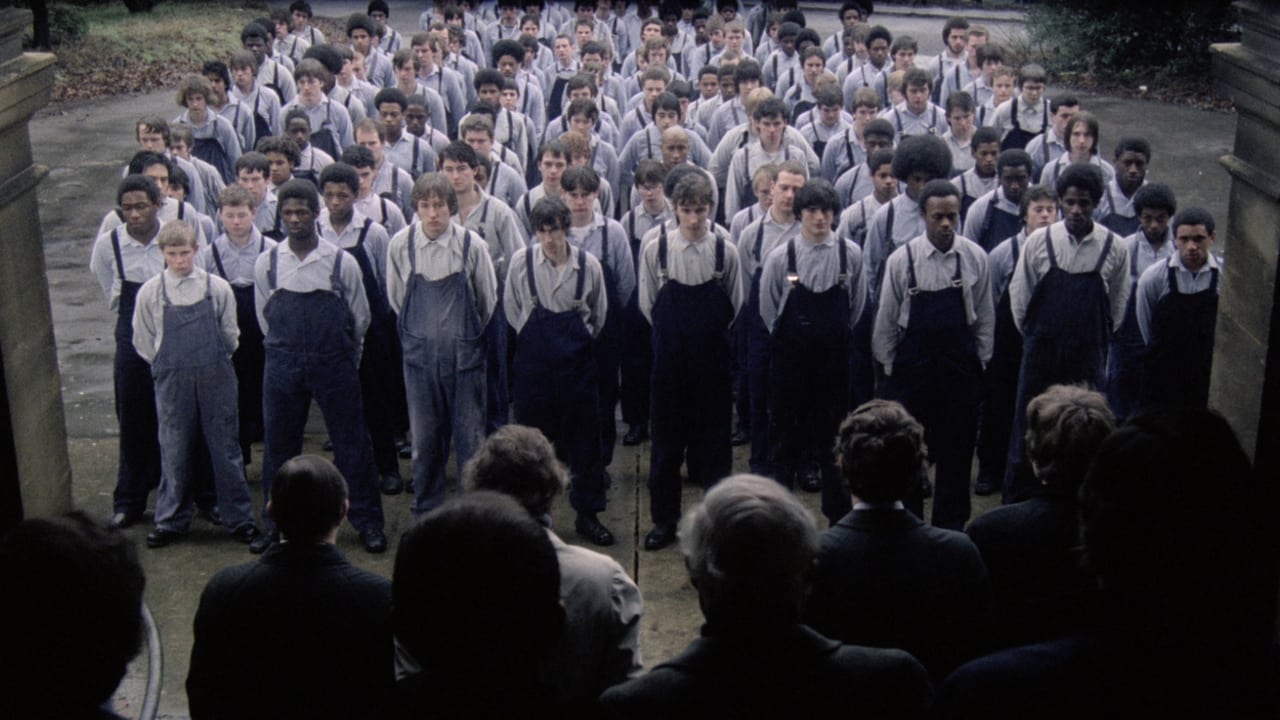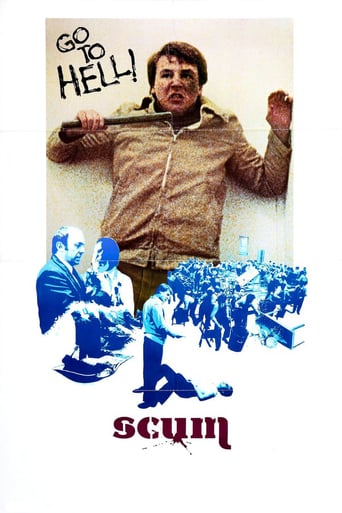



Really Surprised!
Just so...so bad
disgusting, overrated, pointless
It's a mild crowd pleaser for people who are exhausted by blockbusters.
View MoreI regard this film as the truest and best depiction of life in a British borstal, or indeed prison, of any film ever made about being incarcerated. Most films in this genre over dramatize, or trade the reality of prison life, for a pseudo/stereotypical version. By doing this they pander to peoples idea of what its like and lose the reality.Ray Winstone shows why he became a sought after actor, giving a poignant and honest portrayal of the lead character 'Carlin'. Credit also goes to Phil Daniels who plays 'Striper', (a prison term form slashing someone across the face with a razor). He acts with a menacing grin and believable viciousness.The cast as a whole are excellent, the script is true to life and seems as though it was written by a prisoner, plus the set actually looks like a borstal.This is one of my top 20 films, though it isn't for the faint hearted.10 out of 10
View MoreI had heard about this British film, not just because of two of the stars that have gone on to have well known careers, but also because this film was previously originally made for television as part of Play for Today (like Abigail's Party), but it was banned due to its controversial material, so I looked forward to this film version. Basically the film is set inside a young offenders institute, and the three new arrivals at the borstal are Carlin (Ray Winstone), who is taking the blame for his brother crime of stealing scrap metal, Angel (Alrick Riley) who was arrested for carjacking, and Davis (Julian Firth) who attempted an escape from another institution. They are all given rooms, Angel and Davis in private rooms, and Carlin, who wants to keep a low profile, is put in the dormitory, he befriends eccentric and intellectual inmate Archer (Mick Ford), and he often runs into the "Daddy" who "runs" the prison Banks (John Blundell), backed up by cohorts, such as Richards (Phil Daniels), he is looking for a fight. Having watched numerous attacks, including on timid and vulnerable Davis Carlin struggles to settle into the dormitory, but it is after an unprovoked attack that he gets his revenge on Banks, with a makeshift bludgeon he beats him and his companions and replaces him as the "Daddy", later also gaining power over other wings. With his reputation and status secured life for the inmates improves, preventing the victimisation and beatings of younger and weaker prisoners, and also racist attacks, he also becomes some kind of ally to the warders, as a "natural leader" he is granted his request for a single cell, and Goodyear (John Grillo) gives him opportunity of real leadership in the borstal. Prisoner Toyne (Herbert Norville) sinks into despair having learnt from his in-laws in a letter that his wife has died, he slashes his wrists, this second suicide attempt is confirmed as his death and word is spread around the prison. Davis meanwhile is framed by Eckersley (Ray Burdis) for stealing and put on report, but things get worse when three youths gang-rape him in a potting shed, warder Sands (John Judd) witnesses it but only smiles, walks away and takes no action, Davis feeling worthless also kills himself by slashing his wrists. During the night Davis was bleeding to death he did press the button to call for help, but warder Greaves (Philip Jackson) ignored the alarm, and mass hysteria spreads in the prison following this suicide, and this comes to a head when the inmates refuse to eat their dinner, and a full scale riot is initiated by Carlin in the hall. Carlin, Archer and Toyne's friend Meakin (Alan Igbon) are seen bleeding and unconscious being dragged into solitary confinement, but when they are let out things settle, and Governor Baildon (Peter Howell) tells how the damage will be repaid, and it ends with the declaration of a prayer and minute's silence for dead prisoners Toyne and Davis. Also starring John Fowler as Woods and Nigel Humphreys as Taylor. Winstone was obviously little known at the time, he gives a great performance the authoritative prisoner who gains respect through violence, other supporting stars like Daniels and Firth do very well also, there is no storyline or plot as such, but the docudrama style and many disturbing moments, especially the vicious fights and of course brutal rape scene are powerful, it is a controversial but most watchable crime drama. Very good!
View MoreI was browsing the net to find out about movies which were banned for some reason or other. there were some shitty movies in the list like Grotesque. then there were some known great movies like the exorcist and the Texas chainsaw massacre. and then there was this hidden gem. from the bleak start wherein three "new comers" are admitted in the borstal (English correction homes for the youth ), you know you are in for a shocking time. racist expletives, slaps and punches fly with equal gusto. the characterization is vivid. the characters are real creatures and not plastic figurines. the "daddy" of the borstal is played with rare panache by a very young Ray Winstone. then there is a veggie who is convinced that wearing leather contaminates him. so he walks barefoot in all conditions. there are the administrative f*ckers who are always ready to make a governor's report for the smallest of offences. and then there is the governor himself, a religious nut. the direction is top notch. there is no music, none at all so that the atmosphere of a chilly hell is created faithfully. watch this fantastic movie brothers. it is right up there with classics shot in institutions like sleepers, one flew over the cuckoo's nest.
View MoreBrutal, shocking, disturbing and powerful were just some of the words used to describe the film 'Scum' released in 1979. The film portrays what it was like for boys who lived in borstals in the 1970s by following the character of 'Carlin' and other inmates on their everyday experiences including racism, violence, rape and a corrupted system between inmates and guards. When watching this film it lead me to question whether the harsh and punitive system in 1970 actually was so brutal or whether it actually worked in rehabilitating offenders in comparison to the 'softer' approach of restorative justice system which is used today? Borstals first opened in 1902 and were set up as specialized detention centers for young people. By separating the young offenders from adults in their own enclosed institutions was seen as a major step towards the training of the young offender. Borstal trainees were held from one to three years and in this time their regime was military style; strict discipline, hard work and drill. It claimed to be success in preventing re-offending with the first survey in 1915 reporting reconviction rates as low as 27 percent. However, evidence has shown a different reality and it is this reality which is portrayed by 'Scum'. As well as receiving grief from the guards, inmates also had to deal with other inmates including those characters thought of as the leader, known as "The Daddy". Inmates frequently got attacked by "The Daddy" and his gang and had no one to turn to for help as they did not feel they could name who had hurt them without receiving another beating.Many of the elements in 'Scum' were actual problems of borstals in real life and have been found ineffective in rehabilitating juvenile offenders. In the film we see that the members of staff controlling the borstal took advantage of their authority when giving punishments to inmates and beating them sometimes for no reason. This was due to the strong belief that corporal punishment was an effective way of dealing with antisocial behaviour. However, it has been found that harsh punishment is not capable of reforming offenders. It has also been found that the strict and military style discipline applied and depicted in the film can actually promote violence and aggressive behaviour rather than preventing it. Also, one of the inmates in the film asks for books to read but is told that he is not allowed to, therefore he is not given the chance to educate himself making borstal life more damaging on him. If offenders in the borstal were given a chance to educate themselves then the scheme may have been more beneficial.Therefore, although removing offenders from the community means they can not commit crimes, it is actually more likely that they would re-offend once being released due to the lack of rehabilitating behaviours within borstals. However, the borstal system was abolished in 1982 and Young Offender institutions were introduced where more emphasis was placed on rehabilitation.Today, restorative justice has been incorporated into several parts of the youth justice system. It has been argued that in the 1970s crime control was fundamentally flawed as harms associated with social life should not have been regulated by the criminal justice system. Instead, restorative justice sees communication between offender, victim and community in order to resolve a dispute, as being important in justice. This is very different from the borstal style system as it uses inclusionary and community based means rather than excluding offenders to institutions. Restorative justice works through reintegrative shaming, restitution mediation and reparation work on the conscience of the offender. Restorative justice is also very different from borstals as it sees punishment as ineffective and disruptive of community relations. Evidence from Family Group Conferences in New Zealand and also 'reintegrative shaming' in Australia have shown a marked decrease in re-offending rates since the introduction of the schemes. In 1999 following the Youth Justice and Criminal Evidence Act, referral orders and youth offender panels were introduced in England. Therefore, we can see that youth justice seems to be shifting from an exclusionary and punitive system to becoming inclusionary and restorative.However, although restorative justice has been shown to reduce re-offending, when the riots broke out across the UK in summer 2011 many people began to question whether the justice system was becoming too 'soft'. In Britain there are no real punitive measures for youths. The Mayor of London suggested restorative justice was a good approach for looters to face the consequence of their actions. However, as well as this, some of the offenders were to be sent to pupil referral units where the offender is deprived from their usual place in school and taken away from friends to be taught by teachers trained to deal with unacceptable behaviour. Therefore, it may be that it is important to have a mix of both rehabilitative measures as well as more punitive measures to help cut criminality and re-offending. It is not yet known if these means of justice have helped with rehabilitation of these offenders as it is still too early to know. However, this type of justice is far from the brutal and shocking displayed scenes of borstal institutions as shown in Scum.From watching the film Scum we are given an insight into a corrupted and shocking justice system in the 1970s where borstals were not places to rehabilitate young offenders, but instead were places which actually lead to more violence and a daily struggle to live with causing some offenders to even go as far as committing suicide to escape. It may be necessary to keep some punitive system within youth justice as the 'softer' restorative justice approach alone may not be enough to deter re-offending. However, bringing back borstals would certainly not help with youth justice system and new ideas and research is needed beyond these punitive systems of the past.
View More